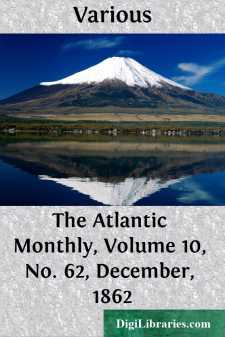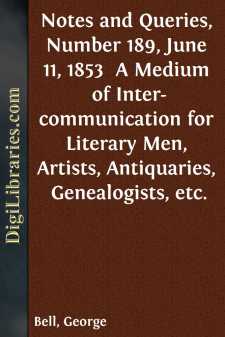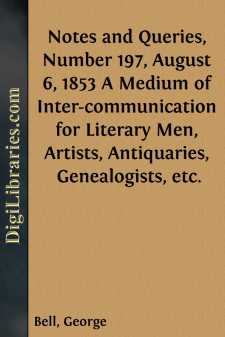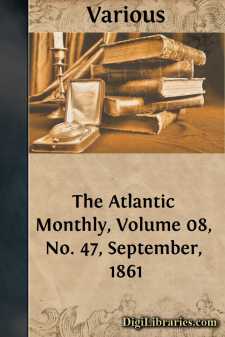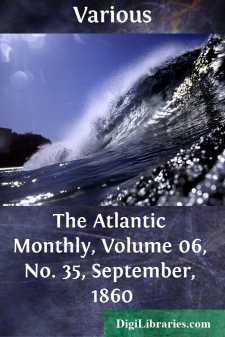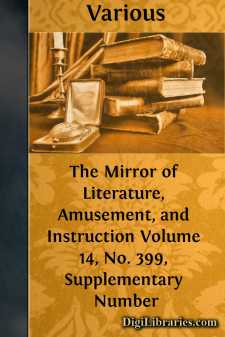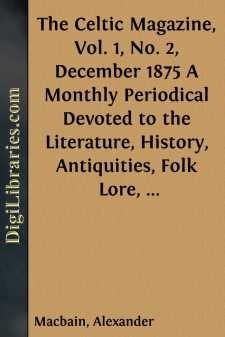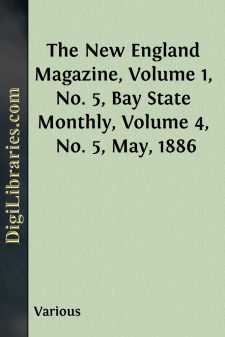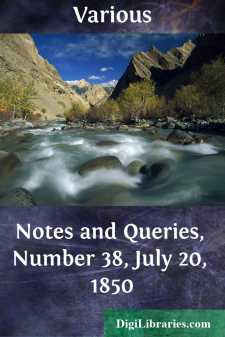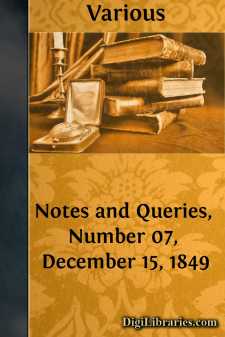Periodicals
- Art 27
- Children's periodicals 59
- Entertainment 5
- Food/Wine 2
- Games/Humor 455
- General
- Health 1
- History 53
- House/Home 1
- Regional 62
- Science/Nature 118
- Transportation 10
General Books
Sort by:
by:
Various
THE PROCESSION OF THE FLOWERS. In Cuba there is a blossoming shrub whose multitudinous crimson flowers are so seductive to the humming-birds that they hover all day around it, buried in its blossoms until petal and wing seem one. At first upright, the gorgeous bells droop downward, and fall unwithered to the ground, and are thence called by the Creoles "Cupid's Tears." Frederika Bremer...
more...
by:
George Bell
TOM MOORE'S FIRST! It is now generally understood that the first poetic effusion of Thomas Moore was entrusted to a publication entitled Anthologia Hibernica, which held its monthly existence from Jan. 1793 to December 1794, and is now a repertorium of the spirited efforts made in Ireland in that day to establish periodical literature. The set is complete in four volumes: and being anxious to see...
more...
by:
George Bell
HIGH CHURCH AND LOW CHURCH. A Universal History of Party; with the Origin of Party Names would form an acceptable addition to literary history: "N. & Q." has contributed towards such a work some disquisitions on our party namesWhigandTory, andThe Good Old Cause. Such names asPuritan,Malignant,Evangelical, can be traced up to their first commencement, but some obscurity hangs on the...
more...
by:
Various
THE SHAKESPEARE MYSTERY. In 1853 there went up a jubilant cry from many voices upon the publication of Mr. Collier's "Notes and Emendations to the Text of Shakespeare's Plays from Early Manuscript Corrections," etc. "Now," it was said, "doubt and controversy are at an end. The text is settled by the weight of authority, and in accordance with common sense. We shall enjoy...
more...
by:
Various
AMONG THE TREES. In our studies of Trees, we cannot fail to be impressed with their importance not only to the beauty of landscape, but also in the economy of life; and we are convinced that in no other part of the vegetable creation has Nature done so much to provide at once for the comfort, the sustenance, and the protection of her creatures. They afford the wild animals their shelter and their...
more...
by:
Various
Verona SPIRIT OF THE ANNUALS FOR 1830. Fair and gentle readers, we present you with a kaleidoscopic view of some of these elegant trifles—the very bijouterie of art and literature—in picture outmastering each other in gems of ingenuity, and in print, exalting a thousand beautiful fancies into a halo of harmony and happiness for the coming year. We call these "trifles," but in the best sense...
more...
In controversy about Ossian, the man on the affirmative side has an immeasurable advantage over all others; and, with an average practical acquaintance with the subject, may exhaust any antagonist. The contents, the connection, and the details; the origin, the tradition, the translation; the poetry, the sentiment, the style; the history, the characters, the dramatis personæ; the aspects of nature...
more...
by:
Various
The plan for the establishment of a second college in Connecticut was not carried into effect until after the time of the political and religious revolution which secured the adoption of a State Constitution in 1818. Probably no such plan was seriously entertained till after the close of the war of Independence. The Episcopal church in Connecticut had, one may almost say, been born in the library of...
more...
by:
Various
NOTES. WHAT IS THE MEANING OF "DELIGHTED," AS SOMETIMES USED BY SHAKSPEARE. I wish to call attention to the peculiar use of a word, or rather to a peculiar word, in Shakspeare, which I do not recollect to have met with in any other writer. I say a "peculiar word," because, although the verb To delight is well known, and of general use, the word, the same in form, to which I refer, is...
more...
by:
Various
MARRIAGE CONTRACT OF MARY QUEEN OF SCOTS AND THE EARL OF BOTHWELL. [Among the curious documents which have been produced from time to time before the House of Lords in support of peerage claims, there have been few of greater historical interest than the one which we now reprint from the Fourth Part of the Evidence taken before the Committee of Privileges on the Claim of W. Constable Maxwell, Esquire,...
more...


